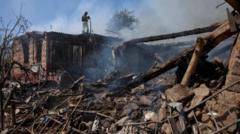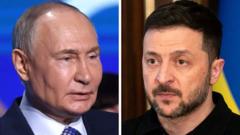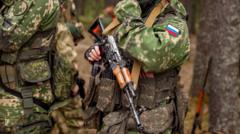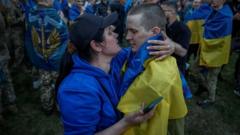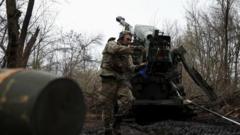In recent developments concerning the Russia-Ukraine war, Britain has diminished the scale of diplomatic talks initially set for Wednesday aimed at establishing a peace agreement. This reduction followed the unexpected withdrawal of U.S. Secretary of State Marco Rubio, leading British Foreign Secretary David Lammy to also withdraw from the meeting. The two officials acknowledged through a conversation that technical discussions needed to continue before elevating discussions to involve foreign ministers.
Ukraine Cease-Fire Negotiations Encounter Setbacks Amid Diplomatic Pullouts

Ukraine Cease-Fire Negotiations Encounter Setbacks Amid Diplomatic Pullouts
Plans for high-level cease-fire discussions in London are jeopardized following Secretary of State Marco Rubio’s withdrawal, probing questions about diplomatic efforts to resolve the ongoing conflict.
Despite the absence of high-level officials, lower-level diplomats from notable nations including Britain, France, Germany, Ukraine, and the United States are still expected to hold meetings on Wednesday to delve into detailed aspects of a proposed peace plan originating from the Trump administration. Key stipulations circulating within the plan include the premise that Ukraine must recognize Russia's annexation of Crimea, a demand that President Volodymyr Zelensky firmly rejected, citing a violation of Ukraine's constitutional integrity.
The reconsideration of the London meeting highlights concerns regarding progress in cease-fire negotiations, with the urgency of resolving the conflict emphasized by Rubio's forewarning that a lack of agreement might shift President Trump’s focus to different priorities. Initially citing logistical issues as the reason for his absence, Rubio later expressed optimism regarding the outcomes of upcoming technical meetings, underscoring the importance of collaboration with UK and Ukrainian counterparts.
British officials commented on the circumstances as a critical juncture for Ukraine, emphasizing the necessity to solidify diplomatic engagements to ensure stability in the Euro-Atlantic region, with Lammy still planning a separate meeting with Ukrainian Foreign Minister Andrii Sybiha and military discussions anticipated between British and Ukrainian defense leaders.
Contributors to this report included Ségolène Le Stradic from Paris. Mark Landler, a seasoned journalist and current London bureau chief of The Times, has reported extensively on U.K. and U.S. foreign policy.
The reconsideration of the London meeting highlights concerns regarding progress in cease-fire negotiations, with the urgency of resolving the conflict emphasized by Rubio's forewarning that a lack of agreement might shift President Trump’s focus to different priorities. Initially citing logistical issues as the reason for his absence, Rubio later expressed optimism regarding the outcomes of upcoming technical meetings, underscoring the importance of collaboration with UK and Ukrainian counterparts.
British officials commented on the circumstances as a critical juncture for Ukraine, emphasizing the necessity to solidify diplomatic engagements to ensure stability in the Euro-Atlantic region, with Lammy still planning a separate meeting with Ukrainian Foreign Minister Andrii Sybiha and military discussions anticipated between British and Ukrainian defense leaders.
Contributors to this report included Ségolène Le Stradic from Paris. Mark Landler, a seasoned journalist and current London bureau chief of The Times, has reported extensively on U.K. and U.S. foreign policy.


